- Home
- John Bellairs
The Figure in the Shadows Page 2
The Figure in the Shadows Read online
Page 2
Jonathan reached in and started handing parcels around.
"Here you are. One for you, Lewis, and one for you, Rose Rita, and even one for you, Pruny. And one for little me."
"Hah," said Mrs. Zimmermann, as she tugged at a piece of string. "I'll bet you saved the best one for yourself."
Lewis had the long curved parcel. When he had ripped the paper off one end, he saw the tarnished brass hilt of a sword. "Oh boy!" he said. "A real sword!" He ripped the rest of the paper off and started swinging the sword around. Fortunately, it was still in its sheath.
"Have at thee for a foul faytour!" he shouted, lunging at Rose Rita with the sword.
"Hey, Sir Ector, watch it, will you?" said Jonathan. Lewis stopped and looked sheepish. Then everybody, including Lewis, laughed.
"You might have known what would happen when you put a sword in the hands of an eleven-year-old boy," said Mrs. Zimmermann. "Here, let me see it."
Lewis handed the sword to Mrs. Zimmermann. Tugging gently, she eased it halfway out of its scabbard. The tarnished blade flashed dimly in the lamplight.
"Whose sword was it?" asked Lewis.
"Grampa Barnavelt's," said Jonathan. "It's a cavalry saber—you can tell because it's curved and quite heavy. Put it back in the sheath, Florence. Knives make me nervous."
Lewis knew a little bit about Grampa Barnavelt. He had seen his name on the Civil War Memorial, and Jonathan had told him a few stories about the old man, but these stories had merely whetted Lewis's appetite.
"Grampa Barnavelt was a lancer, wasn't he?" asked Lewis.
"That's right," said Jonathan. "Rose Rita, open your package."
Rose Rita was holding a soft little parcel. When she had popped the string and ripped off the paper, she found that she was holding a pile of old clothes. On top was a blue shirt that had been folded up so long it wouldn't come unfolded. Under that was a pair of baggy red pantaloons and a flattened red felt cap with FIFTH MICHIGAN FIRE ZOUAVE LANCERS embroidered on it in gold thread.
"What are the Fifth Michigan... whatever they are?" asked Rose Rita.
"Idiots," snapped Mrs. Zimmermann. "Idiots they were, the whole bunch of them."
"That's true," said Jonathan, stroking his beard. "But that is probably not the answer Rose Rita wanted. In the first place... well, let's let Lewis answer this. He's read about lancers."
"Lancers are cavalry soldiers with long spears," Lewis explained. "They used the spears to run the enemy soldiers through."
"If they got close enough," said Jonathan. "You see, Rose Rita, lancers were sort of a holdover from the Middle Ages, when knights used to knock each other off horses with spears. But in the Civil War, lancers had to charge against soldiers who had muskets and rifles and cannons."
"That sounds kind of dumb," said Rose Rita. "How come they wanted to do that?"
"Well, I'm not quite sure," said Jonathan, "but I think they had some idea that those long spears and flapping pennants and bright-colored uniforms would throw terror into the foot soldiers of the enemy."
"Did they?" asked Lewis.
Jonathan looked confused. "Did they what?"
"Strike terror into the enemy."
"Oh. Well, yes, sometimes they did. But more often than not the soldiers with muskets and rifles cut the lancers to pieces. That is what happened at the Battle of Spotsylvania Court House. The Fifth Michigan charged, and it got wiped out. Only Grampa Barnavelt and a man named Walter Finzer came back alive. And they survived because they never got into the battle."
Lewis's face fell. He had imagined his great-grandfather slashing and lancing and thrusting his way right through the enemy lines. "How come he didn't get into the battle?" he asked.
"Go ahead, Jonathan. Tell them," said Mrs. Zimmermann, grinning. She had heard the story a thousand times, but it still tickled her.
"Well, it's like this," said Jonathan. He coughed, folded his arms, and settled back into his storytelling pose. "Your great-grampa, Lewis, was not one of the bravest men in the world. I think he joined the Michigan Lancers because he thought their uniforms were pretty. But the closer he came to an actual fight, the more scared he got. The Battle of Spotsylvania was going to be his first taste of real combat. Well now. On the night before the battle, Grampa was playing poker by the campfire with some other members of the company, and he found that he was holding a very good hand. I think it was a full house or four of a kind or something like that. Anyway, before long, only Grampa and Walter Finzer were left in the game. Walter was a New Zebedee boy too, and he had joined up at about the same time as Grampa. Well, Walter raised Grampa and Grampa raised Walter, and before long the two of them had thrown every cent they had, and their swords and pistols, into the pot. But when Grampa took off his gold signet ring and tossed it in, Walter didn't have anything to answer it with. Walter tried to borrow money from some of the other men, but they all thought Walter was a deadbeat, and they wouldn't lend him a cent. Walter was about ready to throw in his cards and let Grampa take the pot, when Grampa said, 'How about your lucky piece?' "
"Lucky piece?" said Lewis.
"Yes. You see, Grampa had gotten into the game hoping that he would be able to relieve Walter of the lucky coin he carried. I know it sounds silly, but Grampa was convinced that Walter's lucky coin would get him through the battle without a scratch. Who knows why Grampa thought this? Pilots trust to baby booties and rabbits' feet. Grampa had heard Walter bragging about this coin, so he figured that maybe it would help him." Jonathan smiled sadly. "I think Grampa was so scared he would have trusted to anything to see him through the next day's battle."
"Was it magic?" asked Rose Rita. "The coin, I mean."
Jonathan chuckled. "No, I'm afraid not. But Grampa thought it was, and that's the important thing. To go on with the story, he told Walter to throw the coin in, and Walter refused. Walter was a bullheaded and rather stupid sort, and he didn't want to part with the coin. Finally, though, his friends persuaded him to throw it in. Then Walter and Grampa both showed their hands, and Grampa won. Walter was furious. He screamed and yelled and stomped and swore, and in the end, when Grampa started to rake in the money, he grabbed a pistol out of somebody's holster and shot Grampa in the leg."
"That's awful!" said Rose Rita. "Did Grampa Barnavelt die?"
"No, but the wound put him out of commission for a long while. Walter, of course, was put under arrest immediately, and later on he got a dishonorable discharge from the Army. He might have gotten worse, but Grampa pleaded for clemency for him. You see, Grampa Barnavelt was really a rather soft-hearted and gentle man. He had no business trying to fight in a war."
Jonathan settled back in his chair and lighted his pipe. Mrs. Zimmermann and Lewis went out to the kitchen, and came back with chocolate-chip cookies and ice cream. Suddenly, as everyone was eating, Lewis looked up and said, "Did Grampa keep the coin? Is it still around?"
Jonathan laughed. "He sure did keep it! He put it on his watch chain and told everybody he met how he got it. I got so tired of hearing that story when I was a kid."
"Could we see it?" Lewis asked.
Jonathan looked startled. "See it? Well, I guess so, if I can find it. I imagine it's rattling around in this old trunk somewhere. Wouldn't you think so, Florence?"
"How would I know? It's your trunk. Let's have a look."
Jonathan, Mrs. Zimmermann, Lewis, and Rose Rita gathered around the old chest and started lifting out parcels and unwrapping them. There was a top hat and a black frock coat shiny at the elbows, and some books and three or four albums full of old photos, and one genuine cannon ball. Finally everything was out of the chest but the dust and the dead insects at the bottom. Everything, that is, except one small battered wooden box.
"I'll bet it's in there," said Lewis.
"I wouldn't count on it," said Jonathan. "But let's have a peek anyway."
He reached in and lifted the box out. There was no lock on it, and after a little tugging the lid came off, hinges and all. Inside we
re an old pair of rimless spectacles, a blackened tobacco pipe, and a heavy braided watch chain. A tiny silver coin was attached to the chain.
"Hey, it's really there!" Lewis reached into the box and carefully lifted the watch chain out. He handled it as if it were a string of diamonds. Now he and Rose Rita were examining the coin. It was a strange-looking thing, smaller and thinner than a dime. On one side was a Roman numeral III. On the other was a six-pointed star with a striped shield inside it. "United States of America" was printed around the outside of the star, and under the bottom point of the star was a date: 1859.
"What is it?" asked Lewis. He had never seen a coin like it in his life.
"It's a United States three-cent piece," said Mrs. Zimmermann. "Anyone ought to be able to see that." Rose Rita laughed. "Oh, come on, Mrs. Zimmermann! You're always kidding. You mean this coin was worth three cents way back then?"
"It certainly was. It's worth a little bit more now, because it's old, but it's not very rare as coins go."
"Why did they have three-cent coins?" asked Lewis. "Wouldn't it have been easier to just use three pennies?"
"You'll have to ask the United States Mint why they had three-cent pieces," said Jonathan. "At one time they had half cents and two-cent pieces and half dimes and all sorts of weird denominations. So, as Mrs. Zimmermann says, this coin is not so strange—except for the fact that it's part of the story I just told you."
Lewis looked at the coin and imagined it lying on a heap of money and swords and pistols in the red light of a campfire. He imagined Walter Finzer pulling a gun and shooting Grampa Barnavelt. Blood had been shed because of that coin. Lewis had read a lot, and he knew stories about kings who had fought and killed each other over small objects. Small objects like crowns and jewels and pieces of gold. The coin seemed to Lewis like something straight out of those old tales.
Lewis looked up at his Uncle Jonathan. "Uncle Jonathan, are you sure this coin isn't magic?"
"Sure as sure can be, Lewis. But just to set your mind at ease, why don't you give to to Mrs. Zimmermann for a minute? She knows all about magic amulets and talismans and things of that kind, and I think she could probably tell just by the feel of the thing. Couldn't you, Florence?"
"Yes, I could. At my final exam at the University of Goettingen, when I was getting my doctor's degree in Magic, I had to tell if certain objects were enchanted or not just by feeling them with my fingers. Here, let me see it."
Lewis handed the coin to Mrs. Zimmermann. She rubbed it back and forth between her fingers and stared at it thoughtfully for a few minutes. Then she handed it back to Lewis.
"Sorry, Lewis," she said, shaking her head. "It just feels like a hunk of metal. If it was magic, it would... well, it would kind of tingle in my hand. But there's nothing there. It's just an old coin."
Lewis held the coin up and looked at it sadly. Then he turned to Jonathan and said, "Can I keep it?"
Jonathan blinked absent-mindedly. "Hm?"
"I said, can I keep it?"
"Can you...? Oh. Oh, sure. Go ahead. It's yours. Keep it as a souvenir of the Civil War." Jonathan patted Lewis on the shoulder and smiled.
Late that night, when Rose Rita and Mrs. Zimmermann had gone home and Jonathan had gone to bed, Lewis sat on the edge of his bed looking at the coin. It was too bad it wasn't magic. If it had been, it might've turned out to be one of those amulets that made you brave and strong and protected you from your enemies. Like the pin that an ancient king of Ireland wore in his shirt when he went into battle. As long as he kept the pin on, he couldn't be wounded. Lewis liked that story. He had never gone into battle with sword and shield, but he had gotten into a few fist fights, and he had always lost them. Maybe if he had had an amulet, he would have won those fights. Maybe if he had had an amulet, Woody Mingo would not have been able to steal his hat.
Oh well, thought Lewis, that's the way it goes. He put the coin in the drawer of his bedside table, turned out the light, and went to bed.
Lewis went to bed, but he didn't go to sleep. He lay there tossing and turning and thinking about Woody and the Sherlock Holmes hat and Grampa Barnavelt and Walter Finzer and the three-cent piece. After that he just lay there and listened to the sounds of the house: the clock ticking, the bathtub faucet dripping, the various cracks and creaks and snaps that a big old house makes when it is settling itself for the night.
Flip-flop. Lewis sat up straight in his bed. He knew that sound. He knew it very well—but it was not a nighttime sound. It was the sound of the mail slot.
The front door of Lewis's house had a slot in it for mail. The slot had a hinged metal cover over it, and when the mailman lifted the cover to slide letters in, the cover went flip-flop. Lewis and his uncle both loved to get mail, and no matter where they were in the house, when they heard the flip-flop sound, they came running. The mailman on their route was very talkative, and so he seldom got to their house before two-thirty in the afternoon. But as far as Lewis knew, the mail had never arrived at midnight.
Lewis sat there wondering for a few minutes. Then he got out of bed, put on his slippers and bathrobe, and padded downstairs to the front hall. There on the floor, just below the mail slot, lay a postcard.
Lewis picked the card up and carried it over to the hall window. The gray light of a full moon was streaming in. It was bright enough to read by—but there was nothing to read. The card was blank.
Lewis began to feel creepy. What kind of a message was this? He turned the card over, and was relieved to find that the card was stamped and addressed. But the stamp looked very old-fashioned, and the postmark was so blurred that Lewis couldn't tell where the card had been mailed from. The card was addressed in a neat, curlicued hand.
Master Lewis Barnavelt
100 High Street
New Zebedee, Michigan
There was no return address.
Lewis stood there in the moonlight with the card in his hand. Maybe Rose Rita had gotten up in the middle of the night to play him a practical joke. Maybe—but it didn't seem likely. Lewis turned the card over and looked at the blank side again. His eyes opened wide. Now there was writing on the card.
Lewis's hand began to tremble. He had read about writing in invisible ink, but he had always heard that you had to dust the message with special powders or hold it over the fire to make the letters appear. This message had appeared all by itself.
And Lewis knew what the message said. He could read a little Latin, because he had been an altar boy once, and he knew what Venio meant: I come. Suddenly Lewis felt very afraid. He was afraid of being alone in the dark hallway. But as he stepped quickly across the hall to snap on the light, the card slipped out of his hand. It actually felt as if someone had grabbed it and pulled it away. Lewis panicked and flung himself at the wall switch. Warm yellow light flooded the hallway of the old house. There was no one there. But the card was gone.
CHAPTER THREE
The next morning, as soon as he got up, Lewis went downstairs to look for the mysterious postcard. He looked under the hall rug, and into the cracks between the floorboards. He looked into the blue Willoware vase where Jonathan kept his canes. He looked everywhere. The card had vanished. None of the cracks in the floor was wide enough for it to have slipped through, and the card couldn't very well have floated back out through the covered mail slot. Where did it go?
Lewis didn't feel like talking to Uncle Jonathan about the card, but as he ate his Cheerios that morning, a comfortable explanation occurred to him. The card was probably just part of Uncle Jonathan's magic.
Lewis had lived in the home of a practicing wizard for over a year now, and during that time he had come to expect strange sights and sounds. The mirror on the coat rack showed you your face when you looked in it— sometimes. But more often than not, it would show you Roman ruins in the desert or Mayan pyramids or Melrose Abbey in Scotland. There was an organ in the front parlor that sang radio commercials. And the stained-glass windows in the enormous old house changed the
ir pictures from time to time, all by themselves. Maybe the ghostly card was one of Jonathan's little jokes. Lewis could have found out if his answer was right by asking Jonathan, since Jonathan controlled all the magic in the house. But he was afraid to ask. If his answer was wrong, he didn't want to know about it.
One afternoon in the middle of October, Lewis decided to go back to school early. Most of the time he waited out the noon hour at home, because he was afraid of getting beat up. But today he was going back early because Rose Rita had talked him into it.
Lewis and Rose Rita had had a long talk about his fears. She had tried to persuade him that the only way to conquer his fears was to meet them head-on. He had to force himself to go back to the playground right after lunch. After the first time, the second time would be easier, and so on. This was the way Rose Rita argued. Lewis had been stubborn at first, but he had finally agreed to try it her way. To make things easier for him, Rose Rita had agreed to meet him in the alley next to the school. He wouldn't have to get into a football game or anything. The two of them would just stand around and talk. They could talk about the model Roman galley they were building out of balsa wood. It would be a lot of fun.
When Lewis got to the school, he peered down the long narrow alley. No Rose Rita. At the far end he could hear kids shouting and playing. Cautiously, he began to edge his way down the alley toward the playground. He always expected to get jumped, and sometimes it really happened.
Lewis had gotten about halfway down the alley when he heard something off to his left. It sounded like grunting and scuffling. Lewis turned and saw two kids fighting in the dark shadowy space between the buttresses of the Episcopal church. The kids were Rose Rita and Woody Mingo.
Lewis stood watching, paralyzed with fear. Woody had one hand around Rose Rita's waist, and with his other hand he was pulling her hair. Hard, so that it must really have hurt. But Rose Rita said nothing. Her eyes were closed, and her teeth were set in a rigid grimace.

 The Curse of the Blue Figurine
The Curse of the Blue Figurine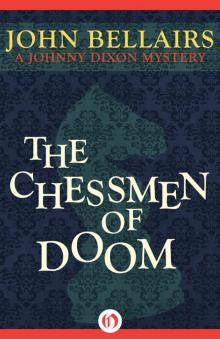 Chessmen of Doom
Chessmen of Doom Secret of the Underground Room
Secret of the Underground Room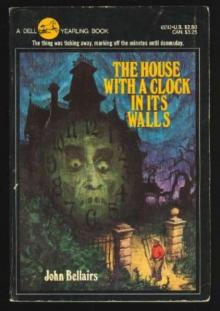 The House With a Clock in Its Walls
The House With a Clock in Its Walls The Vengeance of the Witch-Finder
The Vengeance of the Witch-Finder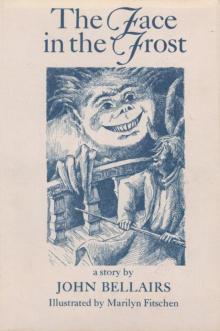 The Face in the Frost
The Face in the Frost Revenge of the Wizard's Ghost
Revenge of the Wizard's Ghost Spell of the Sorcerer's Skull
Spell of the Sorcerer's Skull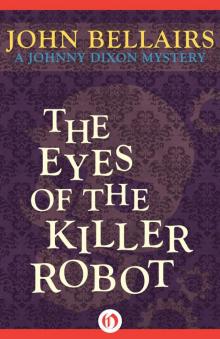 Eyes of the Killer Robot
Eyes of the Killer Robot Mummy, the Will, and the Crypt
Mummy, the Will, and the Crypt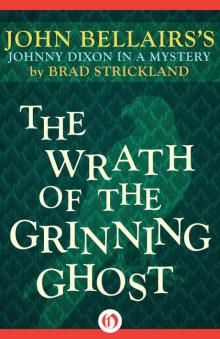 Wrath of the Grinning Ghost
Wrath of the Grinning Ghost The Mansion in the Mist
The Mansion in the Mist The Doom of the Haunted Opera
The Doom of the Haunted Opera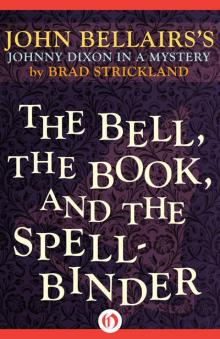 The Bell, the Book, and the Spellbinder
The Bell, the Book, and the Spellbinder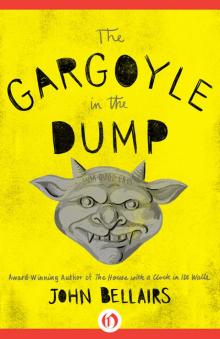 The Gargoyle in the Dump
The Gargoyle in the Dump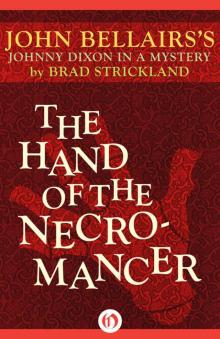 The Hand of the Necromancer
The Hand of the Necromancer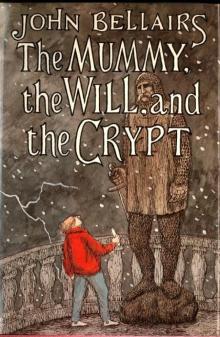 The Mummy, the Will, and the Crypt
The Mummy, the Will, and the Crypt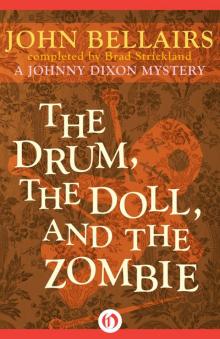 Drum, the Doll, and the Zombie
Drum, the Doll, and the Zombie The Specter from the Magician's Museum
The Specter from the Magician's Museum The Letter, the Witch, and the Ring
The Letter, the Witch, and the Ring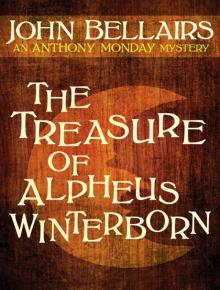 The Treasure of Alpheus Winterborn
The Treasure of Alpheus Winterborn The Dark Secret of Weatherend
The Dark Secret of Weatherend The Figure in the Shadows
The Figure in the Shadows